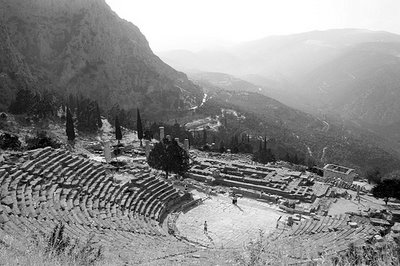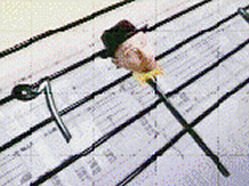Tuesday, August 29, 2006
Random Flickr Blogging #3280: Katrina Memorial Edition
Anyway, I have no sense of humor today, so I thought I'd RFB about Katrina. A while back Bruce Springsteen updated the lyrics of an old blues song written at the beginning of the Great Depression by a man named Blind Alfred Reed: "How Can A Poor Man Stand Such Times And Live?" (Real Audio here; Quick Time here; Windows Media 56 here and 100 here; and here's a nifty YouTube version.) I've had this song running through my head since I woke up this morning. My sense of humor being hors de combat today, I decided to just let the song keep running as I went looking to see what IMG_3280 had to offer. The result is not funny; it just is. These images, of course, have no real connection to the tragedy of Katrina; they're nothing like, for example, the bodies floating through flooded neighborhoods or the starving, dehydrated people waving desperately from roofs and overpasses—or, God help us, the old lady in the wheelchair, who breathed her last in the chaos of the New Orleans Convention Center and was left behind, slumped and silent, when the rescuers finally arrived. I can't stand even thinking about that photograph, and what it represents, right now. What it represents just tears my fucking heart out.
For the curious, Quiddity has a very informative Katrina timeline up; other informative timelines may be found at Think Progress and Cooperative Research. Last year, in the aftermath of Katrina, Greg Palast used the occasion to remind us that a similar tragedy back in 1927 helped spur the ascent of Huey Long—whose populism and popularity in turn helped spawn the New Deal. Now Palast is back again with another reminder of the class-war dimensions of Katrina—and yet another sad tale of how corporatism and cronyism helped lead to the death and displacement of thousands of people and to the devastation of a great American city.
I'd like to dedicate today's Random Flickr Blogging to President Bystander, who made it possible necessary.
And he says "in a little while you'll be alright"
All he gives is a humbug pill, a dose of dope and a great big bill
Tell me, how can a poor man stand such times and live?

And what happened to you poor black folks, well it just ain't fair"
He took a look around gave a little pep talk, said "I'm with you" then he took a little walk
Tell me, how can a poor man stand such times and live?

Martha, get me my sixteen gauge and some dry shells
Them who's got got out of town
And them who ain't got left to drown
Tell me, how can a poor man stand such times and live?

And I ain't got no home in this world no more
Gonna be a judgment that's a fact, a righteous train rollin' down this track
Tell me, how can a poor man stand such times and live?
Random Flickr Blogging explained here; photos from here, here, here, and here.
Labels: Random Flickr Blogging
Tuesday, August 22, 2006
Random Flickr Blogging #0736; or, If All Else Fails...
If he can't do it, no one can!

Call Steve Linn.

Call Steve Linn.

Call Steve Linn.

Call Steve Linn.

Call Steve Linn.

Call Steve Linn.

Call Steve Linn.

Call Steve Linn.

Call Steve Linn.

Call Steve Linn.

Call Steve Linn.
Random Flickr Blogging explained here; photos from here, here, here, here, here, here, here, here, here, here, here, and here.
Labels: Random Flickr Blogging
The Numbers
TV Networks Focus on JonBenet Ramsey Case Over NSA RulingThink Progress has a time breakdown for the three networks—though I think they're being generous to CBS, whose Ramsey story seemed to me to stretch much longer than 3:23. (I knew I should have broken out that stopwatch.) The Tyndall Report hasn't updated for last week yet; it'll be interesting to see how closely their numbers match Think Progress's. These are the broadcast nets, of course; I don't have cable, so I can only imagine what the necrophiles there have been doing now that the original absent pretty white girl is back in the headlines.
The major court ruling on the National Security Agency surveillance program has received scant coverage from the nation’s three major networks. On Thursday, ABC, CBS and NBC all led their nightly broadcasts with the latest in the 1996 murder case of child beauty queen JonBenet Ramsey. ABC devoted twice as much time in its broadcast to Ramsey as it did to the NSA story. CBS offered seven times as much airtime to Ramsey as it did to the NSA story. And NBC devoted 15 times more airtime to Ramsey.
No, wait—I don't have to imagine. Go to The Daily Show's page and dig up the clips titled "Algebra of Cable News" and "Rob Cordrry '97" (both premiered Thursday, 8/17/2006). They've got the whole "I used to be disgusted, but now I try to be amused" thing down pat.
Ugh. Back later with some Random Flickr Blogging, hopefully.
Friday, August 18, 2006
Speaking of Pez Dispensers
Prototype for the head section of the new Jools Holland Pez® dispenser.
Some People are like Pez Dispensers
Congressional Republicans quickly condemned Taylor's ruling, and the Republican National Committee issued a news release titled, "Liberal Judge Backs Dem Agenda To Weaken National Security." Taylor, 73, was appointed to the bench in 1979 by President Jimmy Carter.Glenn Greenwald has more yummy nuggets from the troglodyte right.
Score One for Cynicism
I have no doubt that infinitely more coverage will be devoted to that issue [the arrest of a suspect in the Jon Benet Ramsey murder] on every news program today than on the fact that a federal court just ruled that the President's warrantless eavesdropping program is unconstitutional.Sure enough, the CBS Evening News last night:
- Approximately six minutes at the top of the program to the Ramsey case—complete with a "legal affairs analyst" brought in to pontificate alongside Bob Schieffer;
- Approximately 20 seconds to the warrantless wiretapping decision—just a quick summary of what had happened; no analysis of the decision, no recapping of the issue and why it's important, nada.
It's no wonder this country's in such great shape: we have the So-Called Liberal Media to remind us of what's truly important.
But remember: cynicism is The Daily Show's fault. Remember.
Monday, August 14, 2006
Random Flickr Blogging #5929




Random Flickr Blogging explained here; photos from here, here, here, here, and here.
Labels: Random Flickr Blogging
Wednesday, August 09, 2006
Pipeline
Refineries and gas stations that are not well stocked rush to buy when there’s a sudden shortage, provoking an immediate price increase. Meanwhile, BP and the other oil companies that share in the Prudhoe Bay oil field stand to lose more from the shutdown than they will reap from a spike in prices.Dow Jones Market Watch agrees that BP's profits will take, well, some hit from the pipeline shutdown:
As a result Credit Suisse reduced BP's earnings-per-share forecast for 2006 to $1.08 per share, down 1.7% from $1.10 per share, assuming that the production losses continue until the end of the year. Credit Suisse said in a note that it has in turn reduced its 2007 EPS forecast by 0.2% and its 2008 forecast by a further 0.3%.Doesn't sound like much of a hit. Meanwhile, the Vermont governor obviously had his syrup yesterday morning:A.G. Edwards, the worldwide brokerage firm, estimated that the shutdown would translate into a drop in earnings of 5% or $0.90 a share in the third quarter.
But both A.G. Edwards and Citigroup reiterated their buy ratings on BP, saying the Prudhoe shutdown won't affect the company's fundamentals. Credit Suisse said it keeps its neutral rating on the company.
It is absurd that at a time of record oil profits BP has had to shut down the nation’s largest oil field due to poor maintenance, corrosion and a leak in the pipeline. BP’s carelessness is responsible for substantial, and entirely unnecessary, increases in the price of fuel.Yes: investigate! Ed Markey is on the case:When companies earn record profits, they have a fundamental obligation to invest in and maintain safe and effective infrastructure. It’s quite clear that this infrastructure failure could have been prevented.
Their failure to properly maintain this system suggests a near total disregard for the prices Vermonters, and all Americans, are struggling to pay to fuel their cars and heat their homes.
This situation, and its impact on prices, also further underscores the need for America to seek alternative fuel sources and reduce its dependence on oil.
Congress should immediately investigate this carelessness and take action to protect American consumers from further indifference by BP and other oil companies.
Democrats in Congress asked the U.S. House of Representatives Monday to hold hearings into BP’s Alaska oil operation following the shut down of the pipeline over the weekend. A second rupture at Prudhoe Bay will prevent 400,000 barrels of oil a day from reaching the United States until the pipeline is operational again.More from Markey:Rep. Edward Markey, who serves on the House Energy and Commerce Committee, said the shut down reflects upon BP’s poor mismanagement of its U.S. operations and pointed out that the company has made more than enough money to prevent any problems, according to Reuters.
Because Congress is on recess, any hearings on the matter will not take place until lawmakers return to Washington in early September.
“Today’s shutdown of BP’s eastern operating on the North Slope field appears to be the result of the chronic mismanagement of its drilling operations in the U.S.,” said Rep. Edward J. Markey, a senior Member of the Energy and Commerce and Resources Committees, who questioned Department of Transportation officials about an earlier BP spill of 267,000 gallons of oil from Prudhoe Bay.I for one am particularly curious about whether the Times's confidence that "there's nothing necessarily predatory about what's going on" is warranted. Will BP's profits actually drop, or will its pipeline repair costs actually be offset (or more) by gains reaped from higher gas prices (driven up in part by the shutdown), as Greg Palast suggests? Will evidence surface that BP neglected pipeline maintenance with this purpose in mind? Will this shutdown turn out to be BP's version of the "Grandma Millie" strategy? I hate to sound suspicious, but frankly, after almost six years under Bush-Cheney rule, if you're not suspicious, you're not paying attention.“We learned from the Transportation Department in March, after the largest oil spill in the history of the North Slope, that BP had not cleaned many of its pipelines for years. In contrast, other pipelines up on the North Slope are cleaned every few weeks.”
“While BP’s negligence is deplorable, those charged with the oversight of these pipelines must also be given the full powers needed to do their job. The Department of Transportation needs to be given clear legal authority to implement minimum maintenance standards so that these shutdowns are avoided,” continued Rep. Markey. "Agency officials testified to the Subcommittee that they needed such authority, but Congress has not yet approved legislation to give them the full oversight and enforcement powers needed."
Markey said, “With oil above $70 per barrel and BP making record profits, it can afford to properly clean and maintain its pipelines. This sudden loss of production will dramatically increase oil prices and the American people will be footing the bill for this combined failure of DOT's regulatory oversight and BP’s corporate responsibility.”
Cue Sackcloth and Ashes
Tuesday, August 08, 2006
Smell Something?
Years ago, I had the unhappy job of leading an investigation of British Petroleum’s management of the Alaska pipeline system. I was working for the Chugach villages, the Alaskan Natives who own the shoreline slimed by the 1989 Exxon Valdez tanker grounding.Palast says that the Alaskan pipeline shutdown will exacerbate the supply crisis in California, where the largest retailer is ARCO—"a 100%-owned subsidiary of British Petroleum." How convenient.Even then, courageous government inspectors and pipeline workers were screaming about corrosion all through the pipeline. I say "courageous" because BP, which owns 46% of the pipe and is supposed to manage the system, had a habit of hunting down and destroying the careers of those who warn of pipeline problems.
In one case, BP’s CEO of Alaskan operations hired a former CIA expert to break into the home of a whistleblower, Chuck Hamel, who had complained of conditions at the pipe’s tanker facility. BP tapped his phone calls with a US congressman and ran a surveillance and smear campaign against him. When caught, a US federal judge said BP’s acts were "reminiscent of Nazi Germany."
This was not an isolated case. Captain James Woodle, once in charge of the pipe’s Valdez terminus, was blackmailed into resigning the post when he complained of disastrous conditions there. The weapon used on Woodle was a file of faked evidence of marital infidelity. Nice guys, eh?
Now let’s talk timing. BP’s suddenly discovered corrosion necessitating an emergency shut-down of the line is the same corrosion Dan Lawn has been screaming about for 15 years. Lawn is a steel-eyed government inspector who has kept his job only because his union’s lawyers have kept BP from having his head.
Indeed, it’s pretty darn hard for BP to claim it is surprised to find corrosion this week when Lawn issued a damning report on corrosion right after a leak and spill were discovered on March 2 of this year.
Why shut the pipe now? The timing of a sudden inspection and fix of a decade-long problem has a suspicious smell. A precipitous shutdown in mid-summer, in the middle of Middle East war(s), is guaranteed to raise prices and reap monster profits for BP. The price of crude jumped $2.22 a barrel on the shutdown news to over $76. How lucky for BP which sells four million barrels of oil a day. Had BP completed its inspection and repairs a couple years back — say, after Dan Lawn’s tenth warning — the oil market would have hardly noticed.
Palast also mentions a nifty-sounding device called a "smart pig" used in pipeline inspection—and wonders why BP didn't use them more frequently. Indeed. Check out this report (PDF) about the spill discovered on March 2 of this year, where you'll find this choice nugget (emphasis mine):
Although BP told reporters that corrosion problems had caused BP to operate the line between the gathering centers at reduced pressure, BP hadn’t sent a corrosion "pig – a device that travels through the pipeline to inspect its condition – through that line since 1998." [Remember, this report is from March, 2006.]Well, they're certainly worried about corrosion NOW. From the BP news conference transcript (PDF):[...]
The ongoing war with corrosion on the North Slope increases the importance of ensuring that the leak detection system is effective. But over the last decade BP has consistently argued for less stringent leak detection requirements on the North Slope, while delaying installation of a state-of-the-art system that might have alerted field operators to the problem before the spill turned into the largest in North Slope history.
Bob Malone [Chairman and President, BP America] I would add a comment. Again, we based our corrosion program in cooperation with agencies what we thought was an adequate program. Clearly it is not. In replacing the lines, what we hope to do is enhance that program so that they can have cleaning pigs go through and then ultrasonic pigs go through – smart pigs, so that we can further enhance the program we have been using. That is one of the main reasons for replacing the lines."Rectified going forward." Sounds like a euphemism for a certain act known to happen in prisons‐only in this case, it's consumers getting reamed. As Nils Pratley says in the Guardian,Steve Marshall [President, BP Exploration Alaska] If I could add just one more comment. I don’t want to leave the impression that we have had no monitoring of those lines. In the early 90s as bill described it, pigging was found to be difficult because of the amount of scale and solids. So, we did not have, looking back, a regular pigging program. What we did have was a regular program of ultra sonic surveys to determine the condition of the lines. We believe that would have been an acceptable and adequate replacement. Particularly given that most of these lines are above ground. That technique is available to us, where it is not available to many locations where there are buried lines. Clearly, in hindsight, our program was insufficient and will be rectified going forward.
It is less easy to be sympathetic after yesterday's confession to 16 anomalies in 12 locations that have "called into question the condition of the oil transit lines". In other words, this appears to be a case of straightforward corrosion. As one or two US politicians were already saying yesterday, it is extraordinary that such a crucial pipeline could deteriorate to the degree that a full shutdown is required.Use it! With extreme prejudice.Rightly or wrongly, there will be suspicion that capital investment was trimmed during the 1990s, when the oil price was low and cash was tight. It is far too early for anybody to make that allegation in concrete terms, but sentiment is what often counts in the oil game. The growing lobby in the US for a windfall tax on the oil majors has just been handed another weapon.
We know that Enron was able to boost its profits during the California electricity crisis a few years ago by manipulating the transmission lines that supplied electricity; is it far-fetched to wonder whether BP might be doing something similar with oil pipelines?
Do you suppose anyone in the Bush Administration cares enough to investigate?
Oh, well—I didn't need another reason to buy gas from CITGO, but now I've got one.
Monday, August 07, 2006
Random Flickr Blogging #7281




Labels: Random Flickr Blogging
Sunday, August 06, 2006
Bastard Father of the Friedman
Brooks is the perfect priest of American conservatism, and by conservatism I don't mean the bloodthirsty, gun-toting, go-back-to-Africa, welfare-bashing right-winger conservatism of the NRA and Sean Hannity and the Bible Belt. I mean the dickless, power-worshipping, good-consumer pragmatic conservatism of Times readers and those other Bobos in Paradise who have exquisitely developed taste in furniture, coffee and television programming but would rather leave the uglier questions of politics to more decisive people, so long as they aren't dangerous radicals like Michael Moore or Markos Zuniga.Indeed, Brook's recent "liberal inquisition" column on the Lieberman-Lamont race was hysterical in more ways than one. But Taibbi's piece brought to mind a vintage bit of Brooks—a sentence so jaw-droppingly silly and/or shameless that it's permanently etched into my memory as quite possibly the dumbest, hackiest thing I've ever seen come off the pen of a New York Times columnist (and that's saying something). This is from Brooks's column (also available here for free)of November 4, 2003, a column with the portentous title "A Burden Too Heavy to Put Down" (emphases mine):That's why the marriage of David Brooks and the Democratic Leadership Council makes perfect sense. It's repugnant and the kind of thing one should shield young children from knowing about, but it makes perfect sense. Both prefer a policy of being "cautious soldiers," "incrementalists" who shun upheavals and vote the status quo, although they subscribe to this policy for different reasons.
Brooks worships the status quo because he has no penis and wants to spend the rest of his life buying periwinkle bath towels without troubling interruptions of conscience. The DLC, a nonprofit created in the mid-1980s to help big business have a say in the Democratic Party platform, supports the status quo because they are paid agents of the commercial interests that define it.
Moreover, Brooks and the DLC have this in common: While they both frown on the open flag-waving and ostentatious religiosity of the talk-radio right-wing as being gauche and in bad form, they're only truly offended by people of their own background who happen to be idealistic.
Hence the recurring backlash by both against the various angry electoral challenges to the establishment of the Democratic Party -- including, most recently, the campaign of Ned Lamont, challenger to Joe Lieberman's Senate Seat in Connecticut.
Somehow, over the next six months, until the Iraqis are capable of their own defense, the Bush administration is going to have to remind us again and again that Iraq is the Battle of Midway in the war on terror, the crucial turning point where either we will crush the terrorists' spirit or they will crush ours.When I first read this, I was mostly taken by the insane analogy: a guerrilla war against ragtag insurgents in a desert country which we invaded under false pretences is like a massive naval battle against the sophisticated forces of a sovereign nation that had attacked us by surprise six months earlier? Even if we're generous to Brooks and focus not on the hilariously bad analogy but on the "turning point" assertion—the Battle of Midway was the turning point in the Pacific War in the sense that it marked the end of Japanese advance and the beginning of Japanese retreat—well, the war in the Pacific dragged on another three years, but it ended in a clear victory for us; by contrast, here we are, almost three years after Brooks's column, and even Thomas Friedman is throwing in the towel on Iraq. Oops.
But wait! Looking at it again now, I see...why, yes—Brooks actually said, "over the next six months, until the Iraqis are capable of their own defense." It's a Friedman! And, hey, according to FAIR's own chronology of the Friedman, Friedman's first invocation of the Friedman didn't occur until November 30, 2003—almost four weeks after Brooks suggested that by early May, 2004, things would be all better in Iraq and we wouldn't have to be reminded that, dammit, this is the Battle of Midway all over again, it really is. Friedman did not invent the Friedman; Brooks has been its bastard father all along! So he does have a penis. We might have a situation here akin to the dispute over whether Leibniz or Newton invented calculus, but then calculus is actually good for something. Perhaps the Friedman/Brooks priority dispute is closer to that over who invented television: we may argue over who deserves first credit for it, but we can all agree that, all these years later, their invention is mostly full of crap.
I still boggle over Brooks's metaphor. If you actually believe that there's a strong analogy between the Battle of Midway and the war in Iraq, then you're an idiot. If you don't actually believe that there's such an analogy but you profess it anyway in order to associate Bush's unnecessary, unjustified, and unintelligent invasion of Iraq with World War II, then you're a whore. Either way, by saying such things on the pages of the New York Times, you've earned a measure of contempt. So pile on, Matt Taibbi. David Brooks has earned scads of it.
The only way Iraq could be called "the Battle of Midway in the war on terror" is if our response to the Pearl Harbor attack had involved the invasion of Equador. (And if George W. Bush had been in office then, it would have. You just know it.) Alas that the war in Iraq is more like the invasion of Manchuria in the war on terror—and that we're on the dark side of that analogy.
And no amount of periwinkle bath towels will change that.
Saturday, August 05, 2006
Democracy in America?
- poll at least 5 percent, AND
- have spent and/or raised $500,000.
As writer/activist Barbara Ehrenreich said at a Tasini campaign forum protesting the exclusion (Village Voice, 8/2/06), "When you have to have half a million dollars to tell people what you stand for, then we're not talking about democracy anymore, we're talking about plutocracy."One cannot help but be reminded of the halcyon days of 2000, when Ralph Nader was not only forbidden to participate in the televised presidential debates but forbidden even to view one—despite the fact that he had a ticket—from "an alternative viewing site." Check out the Debate This! site for a brief on how the "bipartisan" Commission on Public Debates took over control of the presidential debates from the nonpartisan League of Women Voters in 1987.The League of Women Voters, which for many years served as the main sponsor of national and local debates, requires only that a candidate has met the legal standard for getting on the ballot—in this case, 15,000 signatures. Tasini received 40,000 signatures, placing him well over that mark.
Tasini is Clinton's only primary opponent and has been outspoken in his opposition to the Iraq War, which Clinton has consistently supported. By shutting Tasini out of the debate, NY1 is limiting the discussion of important viewpoints and ultimately limiting voter choice.
Want a good laugh? Check out the CPD's mission statement (emphasis mine):
The Commission on Presidential Debates (CPD) was established in 1987 to ensure that debates, as a permanent part of every general election, provide the best possible information to viewers and listeners. Its primary purpose is to sponsor and produce debates for the United States presidential and vice presidential candidates and to undertake research and educational activities relating to the debates. The organization, which is a nonprofit, nonpartisan corporation, sponsored all the presidential debates in 1988, 1992, 1996, 2000, and 2004.Then check out theirCandidate Selection Process:
The mission of the nonpartisan Commission on Presidential Debates (the "CPD") is to ensure, for the benefit of the American electorate, that general election debates are held every four years between the leading candidates for the offices of President and Vice President of the United States."Between the leading candidates"—by which we mean, of course, the ones who attract enough deep-pocketed supporters to buy enough advertising to float to the top of the money-driven primary process. Whether the allusion here is to cream or to scum is, I fear, a matter of perspective.
The goal of the CPD's debates is to afford the members of the public an opportunity to sharpen their views, in a focused debate format, of those candidates from among whom the next President and Vice President will be selected....a field which this very selection process magically helps to whittle down to two pairs from the two parties whose representatives run the organization which runs the debate.
In each of the last four elections, there were scores of declared candidates for the Presidency, excluding those seeking the nomination of one of the major parties. During the course of the campaign, the candidates are afforded many opportunities in a great variety of forums to advance their candidacies.Yes, "opportunities" like being blocked from other televised debates because your campaign hasn't raised or blown through half a million dollars.
In order to most fully and fairly achieve the educational purposes of its debates, the CPD has developed nonpartisan, objective criteria upon which it will base its decisions regarding selection of the candidates to participate in its 2004 debates. The purpose of the criteria is to identify those candidates who have achieved a level of electoral support such that they realistically are considered to be among the principal rivals for the Presidency.Any chance that a third-party candidate might "realistically" improve their "level of electoral support" by kicking corporate-friendly establishment candidates' asses in front of millions of Americans on national TV is, of course, practically ruled out by these "nonpartisan, objective criteria." Funny how that happens.
The CPD's third criterion requires that the candidate have a level of support of at least 15% (fifteen percent) of the national electorate as determined by five selected national public opinion polling organizations, using the average of those organizations' most recent publicly reported results at the time of the determination.It's an arbitrary criterion that they basically pulled out of their corporate-funded asses, but hey, it keeps out the riffraff.
Sure, in the world's proudest, richest, most powerful "democracy," the two major political parties control the very debates through which underfunded upstarts might be able to challenge their stranglehold on power and for-profit media corporations double as gatekeepers who ensure that only candidates with deep enough pockets get to participate in televised debates, but remember: it's The Daily Show that makes kids cynical.
Friday, August 04, 2006
Hitchcapping
With the Program
I think there are a lot of things to talk about. One of the first things to understand is that the media in this country are obsessed with a timeline, establishing when history began in this story. And usually in the media, it begins when Palestinians attack. CBS reporter Bob Simon said just as much a couple of weeks ago on the evening news. June 25th, Hamas captures an Israeli soldier. That's when history began. July 12th, Hezbollah does the same, captures two Israeli soldiers. That's when this story begins.Sure enough, here's how our local daily educated us a few days ago, in a story on local people with connections to the Lebanon conflict:You can appreciate this history, but you have to ignore a lot of very relevant history: dozens of Palestinians dead in Gaza in the months prior; the attempt to destroy the Palestinian government in Gaza; the fact that the day before this capture of an Israeli soldier in the West Bank, two Hamas members, alleged Hamas members, were captured by Israeli forces in Gaza, crossing that border. We hear a lot of talk about borders and sovereignty being the story, but when Israel crosses that border, it's apparently not a story.
The same is true in Lebanon. There's a lot of context to that story that predates July 12. In late May, a member of Islamic Jihad was killed in Lebanon. Many people in Lebanon and Israel actually think Israel had something to do with it. Border skirmishes had been going on for the past month and a half or so. These are things that are excluded from the timeline. If you read your newspaper, they have a graph, they have a chart. Almost all of them have done this. And they begin on June 25. They begin on July 12. And they ignore all of this relevant back story.
On July 12, Hezbollah guerrillas crossed the Lebanese border into Israel and captured two Israeli soldiers, sparking a massive Israeli retaliation that has killed more than an estimated 520 Lebanese. Thirty-three Israeli soldiers have died, and Hezbollah rocket attacks on northern Israel have killed 19 civilians.It's always nice to know that your local daily will get with the program: other parties are responsible for "sparking" conflict; the Israelis merely engage in "retaliation." Never mind the evidence that the current "retaliation" was planned well in advance. Never mind that the ostensible "retaliation" so far has included striking bridges, power plants, fleeing civilians, and ambulances. Never mind that the "retaliation" so far may have killed 900 and displaced a million Lebanese. If this can legitimately be framed as "retaliation," then the next time someone cuts me off in traffic, I'm going to follow them home, cut their power, salt their lawn, beat up their children, set fire to their house, and take potshots at them as they try to flee. When the police arrive, I'll tell them it was just "massive retaliation" and that the other party was at fault for "sparking" the conflict. I'm sure they'll agree that justice is on my side.
The other day I heard someone mumbling about how the American media is "anti-Israel." I wish I'd thought to ask him to explain what's "anti-Israel" about describing the systematic slicing and dicing of Lebanon as "retaliation" for the kidnapping of two soldiers. But it probably would have been "anti-Israel" of me to ask the question in the first place.
Tuesday, August 01, 2006
Random Flickr Blogging #8485







Labels: Random Flickr Blogging






